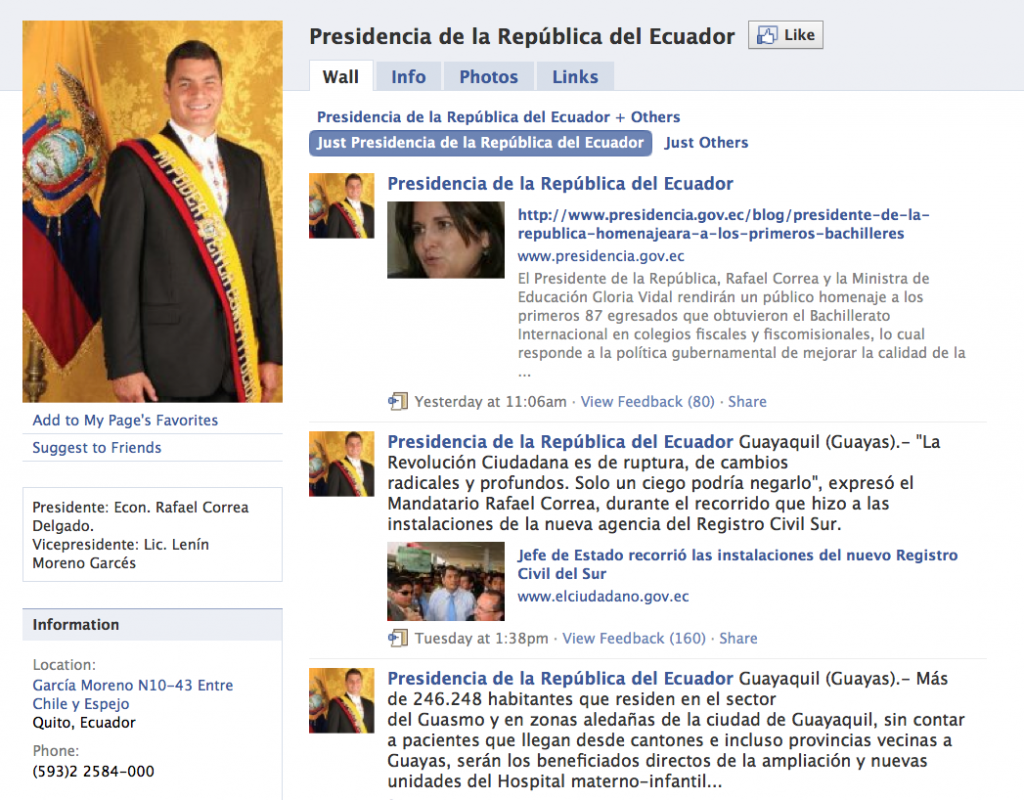Use of the Internet and social networks by the government of Ecuador is rapidly increasing. Is this an attempt to increase government transparency, a new media strategy or alternatively, is this the government's way of bypassing the media silence?
Based at the International Centre of Higher Studies in Communication for Latin America (@ciespal) [1] [es], Alexandra Ayala is carrying out research [2] [es] into the online presence of the Ecuadorian President Rafael Correa [3].
El portal oficial de la Presidencia de la República (www.presidencia.gob.ec), es multimedia e interactivo, permiten a sus visitantes enlaces directos con una serie de canales y redes sociales como: El Ciudadano, periódico digital oficial del Gobierno; facebook; twitter; youtube; vimeo; flickr; livestream; canal de distribución de audios; canal de distribución de PDF; canal de distribución de power point; sitio streaming en vivo; ministerios, entre otros
The International Centre of Higher Studies in Communication for Latin America has posted [8] [es] various tweets [9] [es] in relation to their findings:
#ciberactivismo [10] El monitoreo arroja como resultado que la actividad del presidente en redes sociales es alta [8]
#ciberactivismo [10] Rafael Correa fue el primer presidente latinoamericano que tuvo un blog. Eso se le reconoce a internacionalmente
The Facebook [11] [es] page, “Presidencia de la República de Ecuador” (the Presidency of Ecuador) has more than 9000 fans and the Twitter account, “Presidencia de Ecuador” (@Presidencia_Ec [12]) [es], has 27,866 [12]followers.
Discussing national politics on social networks is not a new phenomenon, however the online presence of the Government of Ecuador is somewhat unique. Referring to a police strike [14]that took place on September 30, Edward Gonzalez [15] writes,
EN ECUADOR el lider de la policia nacional y el presidente ya no son amigos.. por lo menos eso dice sus cuentas en facebook jiji..
This is not a small issue neither. Five years ago, Ecuadorians were talking about the ineffeciency displayed by their government, the political processes and the judiciary in addressing the issues of the internet and the use of new technologies by those in the Andean subregion.
As the online newspaper Juventud Rebelde highlighted [16] [es],
Facebook [17] ha devenido una vía de información y de movilización alternativa, donde los simpatizantes del presidente ecuatoriano suben videos y fotos, enlaces con publicaciones de diarios y televisoras y comentan la situación del país en el grupo El grupo llamado «No al golpe de Estado en Ecuador».
On Facebook, “Marcha por la decencia nacional [18]” [es] (March for national decency) and “Verde Esperanza” [19] [es] (Green Hope) are online initiatives taking place on social networks in Ecuador in support of President Correa.
ALT1040 [20] [es] tries to explain the use of social networks by the government of Ecuador due to a backdrop of opposition from the national media.
En mi último viaje a Ecuador noté como algunas acciones hechas por el presidente Rafael Correa están siendo extrañamente ignoradas por los medios masivos ecuatorianos, mi ejemplo favorito es el pago de la deuda al Fondo Monetario Internacional, una gran y positiva noticia que casualmente no aparece en ningún lado de la página principal de El Universo [21], supuestamente el diario más serio de ese país, aunque sí tienen un artículo al respecto, pero que es sumamente pequeño y una simple reproducción de un cable de Reuters;
Other countries are also realising the importance of social networking in Ecuador and several other accounts are now popping up covering the affairs of the country – accounts such as those belonging to Centro Knight UT [22] [es] (@centroknightut [23]), Gerardo Albarrán (@saladeprensa [24]) [es], @twitvenezuela [25] [es] as well as other Twitter accounts [26] [es] that tweeted about the police strike on September 30 in Ecuador.
The reliance upon social networks and the Internet has opened up other opportunities. On one occasion, the official website of the Presidency of Ecuador was hacked and forced offline. LaPatilla [27] [es] covered this story underlining how this incident resulted in the “sexy” side of the President being shown.
El presidente de Ecuador, Rafael Correa, también tiene su Facebook. En él se retratan varias de sus facetas durante su mandato en ese país. Allí Correa muestra su lado más “pícaro y sexy”, además de sus habilidades musicales…
B10, an online portal for discussing what's happening in Ecuador, posted an article relating to the Facebook [28] [es] account belonging to the former President of Ecuador, and the man President Correa blamed [29] for the police uprising of September 30, Lucio Gutiérrez [30]. This illustrates that social networks, politics and information can all come together in one place resulting in transparency and the involvement of the public.
